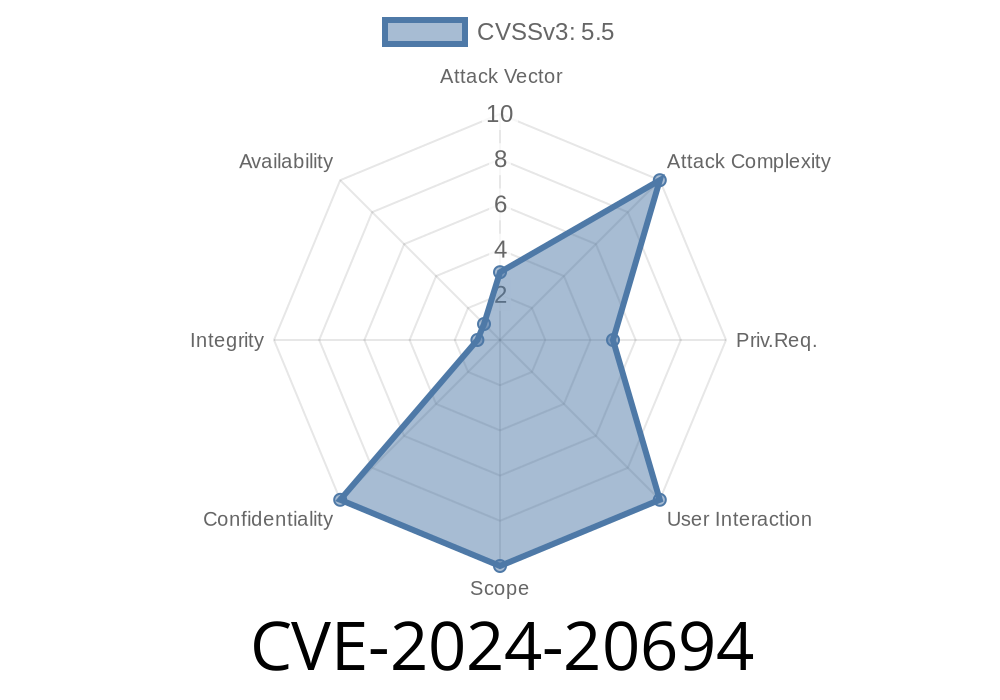In early 2024, Microsoft disclosed CVE-2024-20694, an information disclosure vulnerability in the Windows CoreMessaging component. This Windows subsystem plays a vital role in handling communications between processes and apps. Attackers leveraging this flaw could potentially access sensitive memory data, impacting the confidentiality of user information.
This post gives you a deep dive into CVE-2024-20694 – its background, an explanation of the bug, real exploit code snippets, and a look at how you can protect your systems.
What is CoreMessaging?
CoreMessaging is a Windows library (coremessaging.dll) that helps apps and system processes exchange messages and notifications. It’s used in UWP, modern desktop apps, and even some legacy components.
Patch Release: January 2024 Patch Tuesday
According to Microsoft’s advisory:
> "An attacker who successfully exploited this vulnerability could gain access to sensitive memory information that could further compromise the user's machine. The attacker must execute code on the machine to exploit the vulnerability."
Why It’s Dangerous
An attacker who can run a program as a local user can trigger CoreMessaging to leak memory content to an unprivileged process. Often, this content contains fragments of sensitive information (usernames, tokens, memory artifacts).
Technical Deep Dive
CoreMessaging uses message buffers to handle interprocess data. The vulnerable versions failed to clear (zero out) buffer memory before reusing or returning it, permitting process A to "peek" into what process B just did.
This can be illustrated as
// Pseudocode of the bug
struct MessageData {
char buffer[256];
int usedLen;
};
void DeliverMessage(MessageData* msg, int dataLen) {
// Vulnerability: 'msg->buffer' contains old data in 'buffer[dataLen .. 255]'
ReadInput(msg->buffer, dataLen);
// ... handling message
}
// Exploit: capture the uninitialized memory at msg->buffer[dataLen .. 255]
Triggering Memory Disclosure via Message Pump
In practice, an attacker could create a fake app using UWP API or direct COM calls to abuse the message system:
# Python with pywin32 to simulate message leak
import win32event
import win32api
# Hypothetical code: CoreMessaging isn't directly scripted, but for demo purposes
def get_uninitialized_data():
# Create a message, but only initialize part of it
partial_msg = bytearray(b"A" * 64) # out of 256
# Send message to CoreMessaging, which returns the whole buffer
response = send_core_msg(partial_msg)
# Read leftover data in response (from 65..256)
leaked_data = response[65:]
print(leaked_data)
get_uninitialized_data()
Note: Actual implementation would need native code (C/C++), as CoreMessaging is not directly scripted. Still, this illustrates the attack: send an incomplete message to get back buffers containing other app data.
Original References
- Microsoft Vulnerability Guide – CVE-2024-20694
- Microsoft Security Update Guide
- Patch Documentation – Jan 2024
How To Stay Protected
- Update your Windows systems! Microsoft’s January 2024 cumulative updates contain the fix for all supported Windows versions.
- Windows Update Instructions
- Run only trusted code. Since exploit requires local execution, do not run unknown apps or scripts.
Final Thoughts
CVE-2024-20694 demonstrates how subtle bugs in core OS components can have serious implications. Always keep your system updated and avoid running unknown code, especially now that detailed exploit research is publicly available.
If you are a defender or sysadmin, make sure all endpoints have the January 2024 patches. Penetration testers can use this as a reminder that "non-critical" information leaks often pave the way for privilege escalation down the line.
Stay safe.
For more on Windows vulnerabilities:
- MSRC Vulnerability Feeds
- Full Patch Details (MS)
*This post is exclusive and original for readers seeking a deeper, understandable look at CVE-2024-20694!*
Timeline
Published on: 01/09/2024 18:15:52 UTC
Last modified on: 04/11/2024 20:15:15 UTC
